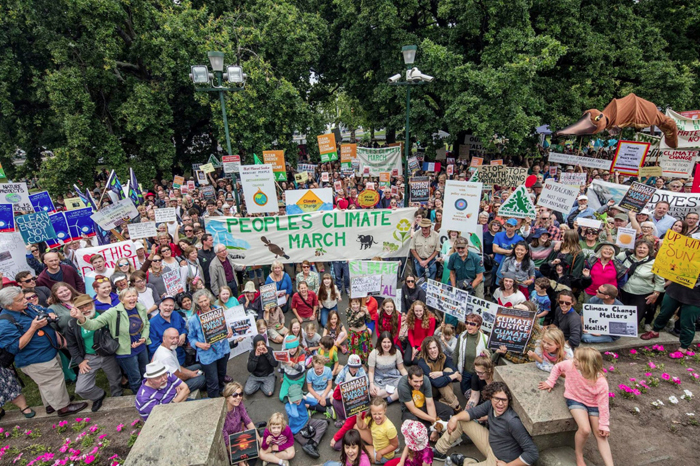Greg Hunt’s optimism is misplaced. It’s past time our government dropped the deception over emissions. [1 December 2015 | Peter Boyer]
Last week we got an idea of how Australia might put its case in the Paris climate meeting when environment minister Greg Hunt outlined his government’s climate credentials at the National Press Club.

Thousands rallied on Hobart’s Parliament Lawns to support strong climate measures on the eve of the Paris meeting. PHOTO Rob Blakers
Fossil fuels and the global carbon budget, presently dominating the global climate debate, were entirely absent from his speech. He mentioned coal once, in a criticism of Labor’s carbon tax rebate for brown coal generators, but he was silent on its emissions.
He did talk about the mysterious disappearance of Australia’s official 2020 abatement task, calculated in 2013 to be 755 million tonnes of carbon dioxide. “We have closed the emissions gap and go to Paris officially sub-zero and on track to beat our 2020 target,” he said.
But carbon analysts Reputex and Pitt & Sherry say that our emissions are rising. According to Reputex they will actually be 6 per cent higher in 2020. So how can Hunt say this?
The answer is the gift that keeps on giving, the 1997 Kyoto Protocol. Embedded in that agreement was what’s known in global climate circles as the “Australia clause”. Under this special deal we could count avoided land clearing as an emissions cut, enabling us to increase emissions by as much as eight per cent while claiming we were lowering them.
At the end of the Kyoto period in 2012 our emissions were well below that limit, so we were entitled under what Hunt called “global gold standard” accounting rules to carry that abatement forward. So even when our emissions are rising, we can say we’ve cut them.
Hunt said last week that both major parties have used these rules, and he’s right. Under both Kevin Rudd and Julia Gillard, Labor used the Kyoto escape clause to make Australian emissions look good. That’s politics at work, you might say, but by any measure it’s also deception.
Hunt said he’s confident that Paris will be the start of “a process that will keep the world below a two degree change”. He envisaged five-yearly reviews of targets, starting in 2020, which presumably would toughen up our present commitments.
In times when international diplomacy took place behind closed doors and we had to accept blindly the wisdom of our masters, Hunt’s breezy optimism might have induced the same in others. But now we know about those gold standard rules.
A five-yearly review is always a good lurk for a government. In this case it takes us beyond two Australian elections, out of sight and out of mind, and lets governments off the hook in Paris. But decades of this sort of procrastination have already brought the world to Code Red territory.
In July, the Climate Change Authority used scientific evidence to determine that a 2030 Australian target consistent with a reasonable chance of avoiding 2C of warming would be at least 45 per cent below 2005 levels – 17C above the upper limit of the government’s target.
Labor under Bill Shorten has now committed itself to that minimum CCA target and set a further aim of zero net emissions, or carbon neutrality, by 2050, which both scientific and economic institutions have identified as an appropriate target for all developed economies.
To anyone who’s followed the science of climate, there’s nothing untoward about this ambition. In fact it’s conservative, given continuing upward trends in emissions since 2000, multiple heatwaves and exceptional weather events, and the warmest five years ever from 2010.
Malcolm Turnbull, however, chose to characterise it as “heroic”. That’s a badge Shorten should wear with pride. Bold action in Paris will be supported by most Australians, justifiably anxious about climate change and fed up with smoke-and-mirrors politics.
The prime minister could have dragged out “Electricity Bill” furphies, as some ministers did last week, but limited his attack on Shorten to criticising the policy’s “considerable” expense. He knows it would be unwise to allow his opponent’s policy to dictate his government’s options in Paris.
Turnbull should empower his Paris team, including Hunt and foreign minister Julie Bishop, to listen to what’s being said around them in Paris and commit their country to strong, verifiable measures of substance. And to put away the Kyoto gold standard rules, for good.
